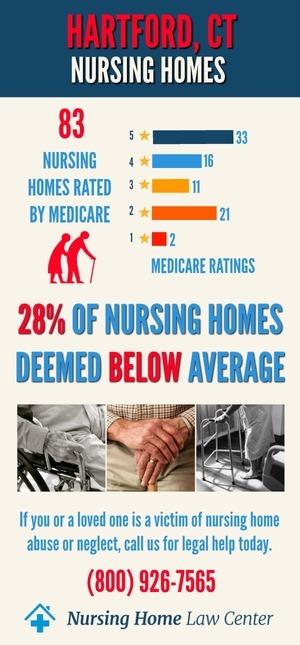The Nursing Home Law Center is committed to providing the legal resources necessary to hold negligent facilities accountable.
Hartford Nursing Home Abuse Lawyer

Licensed in Connecticut
Nursing home abuse is an unfortunate reality affecting many elderly residents in Hartford, Connecticut. Families trust nursing homes to provide safe, respectful care, but when that trust is broken, the consequences can be severe.
Seeking help from an experienced Hartford personal injury lawyer is crucial to ensure those liable are held accountable, secure justice, and protect the well-being of loved ones.
Why Hire Nursing Home Law Center
At Nursing Home Law Center, we are dedicated to obtaining justice and fair compensation for victims of nursing home negligence. Our experienced legal team has a strong record of handling abuse cases and achieving substantial settlements and verdicts.
We conduct comprehensive investigations to ensure every aspect of the abuse, including medical costs, emotional distress, and other damages, is thoroughly addressed. Leveraging our extensive knowledge of nursing home abuse claims, we effectively manage the legal process and advocate relentlessly to protect your rights.
Throughout your abuse case, we offer compassionate, transparent support so you and your loved one are always informed, protected, and confident.
Types of Cases Handled by Our Hartford Nursing Home Abuse Lawyers
Nursing home abuse refers to the mistreatment or harm inflicted on elderly residents by caregivers or staff in a nursing home facility. This abuse can take many forms, each with serious consequences for the victims and their family members. Below are the types of cases our nursing home neglect lawyers handle:
- Physical Abuse: Physical assault involves the intentional use of force that results in pain, injury, or impairment. Physical abuse can include hitting, slapping, or using physical restraints improperly.
- Mental and Emotional Abuse: Mental and psychological elder abuse includes verbal abuse, threats, and actions that cause emotional pain or distress. Examples include yelling, belittling, or isolating a resident.
- Sexual Abuse: Sexual assault refers to any non-consensual sexual contact with a resident. Sexual abuse can be perpetrated by medical staff or other residents and often goes unreported due to fear or shame.
- Medical Malpractice: In nursing homes, this can include inadequate medical care that leads to bedsores, medication errors, or failure to treat infections.
- Negligence: Negligence involves failing to provide necessary care, leading to harm. Examples include poor hygiene, malnutrition, dehydration, or allowing residents to wander off (elopement).
- Financial Abuse: Financial abuse occurs when medical staff or other residents exploit a resident for monetary gain. This exploitation can involve stealing money, forging signatures, or coercing residents into altering legal documents.
- Wrongful Death: Wrongful death cases arise when abuse or neglect results in a resident’s death. This loss could be due to untreated injuries, medical errors, or severe neglect. Families have the right to pursue legal action to hold responsible parties accountable and seek justice for their deceased loved one.
Understanding Your Legal Rights
Nursing home patients are protected under various federal and state laws that safeguard their well-being and ensure they receive proper care.
One of the cornerstone regulations is the Nursing Home Reform Act of 1987, which mandates that nursing homes provide services that maintain the highest level of physical, mental, and psychosocial well-being for their residents. This resident’s bill upholds essential rights, including the right to be free from abuse, neglect, and exploitation.
In addition to federal protections, Connecticut state laws reinforce these rights by requiring nursing homes to adhere to strict standards of care. These regulations seek to prevent instances of nursing home abuse and ensure that violations are met with appropriate legal consequences.
Nursing home abuse victims can file a claim to seek compensation for the harm endured. When a resident lacks the capacity to act on their behalf, a designated representative or family member can take steps to ensure responsible parties are held liable.
How Our Hartford Nursing Home Abuse Attorneys Can Help
At Nursing Home Law Center, our nursing home neglect attorneys bring extensive experience in handling complex personal injury cases. Here’s how we can assist you:
Free Case Evaluation
We offer a free, no-obligation case evaluation to discuss your concerns and assess the strength of your potential claim. This case review helps families understand their legal options without any initial financial obligation.
Case Investigation
Our personal injury attorneys conduct thorough investigations to gather evidence, interview witnesses, and review medical records. This comprehensive approach ensures that all aspects of the abuse or neglect are documented to build a strong case.
Filing the Claim
Once evidence is compiled, our legal team will prepare and file the claim on your behalf. We handle all legal paperwork and deadlines to ensure your case proceeds efficiently and correctly.
Settlement Negotiation
We leverage our experience to negotiate settlements that reflect the full extent of the victim’s damages, including medical expenses, emotional trauma, and other losses. Our goal is to achieve a fair resolution that meets your needs.
Trial Representation
If a fair settlement cannot be reached, our personal injury attorneys will present your case to a judge or jury, seeking the justice and compensation you deserve.
Common Signs of Elder Abuse Among Nursing Home Residents
In Hartford, there are 108 Medicare-approved nursing homes. Among them, 45 (41.7%) have an overall score below or much below average. Forty-seven facilities (43.5%) fall short in health inspections, and 37 nursing homes (34.3%) have inadequate staffing. Twenty-eight facilities (25.9%) are rated poorly in quality measures. [1]
If you suspect nursing home abuse, being aware of these red flags can help family members act swiftly to protect their elderly loved ones.
- Repeated falls or injuries without a clear explanation
- Sudden shifts in mood, withdrawal from social activities, depression, anxiety
- Poor hygiene or an unsanitary living environment
- Bed sores (pressure ulcers)
- Untreated infections and medical conditions
- Malnutrition and dehydration
- STIs or unexplained injuries to sensitive areas
- Fearfulness around certain staff members
- Sudden changes to legal documents such as wills or powers of attorney
- Missing personal belongings
The worst-rated nursing homes in Hartford include:
| Abbott Terrace Health Center | Apple Rehab Cromwell |
| Apple Rehab Farmington Valley | Apple Rehab Rocky Hill |
| Autumn Lake Healthcare at West Hartford | Care One at Redstone |
| Complete Care at Fox Hill | Complete Care at Kimberly Hall North |
| Litchfield Woods Health Care Center | Marlborough Health & Rehabilitation Center |
| Meriden Health and Rehab | Riverside Health & Rehabilitation |
| Salmon Brook Rehab and Nursing | Sixteen Acres Healthcare Center |
| Skyview Rehab and Nursing | Summit at Plantsville, The |
| Valerie Manor | Vanderman Place |
| Wadsworth Glen Health Care and Rehabilitation Cent | Westfield Gardens Nursing and Rehab |
| Wolcott Hall Nursing Center Inc |
Contact a Hartford Nursing Home Abuse Lawyer Today!
At Nursing Home Law Center, our Connecticut nursing home neglect attorneys are dedicated to protecting nursing home residents’ rights and holding responsible parties accountable. We work on a contingency fee basis, which means you don’t pay any fees unless we successfully win your case.
If you suspect nursing home neglect or abuse, don’t wait. Contact us today for a free consultation, and let us help you take the first step toward justice and peace of mind.
Call us at (800) 926-7565 or fill out our contact form.
References: [1] Medicare


